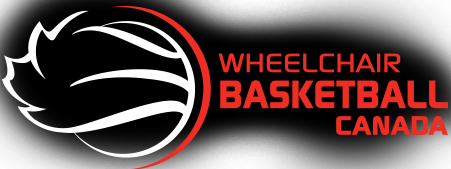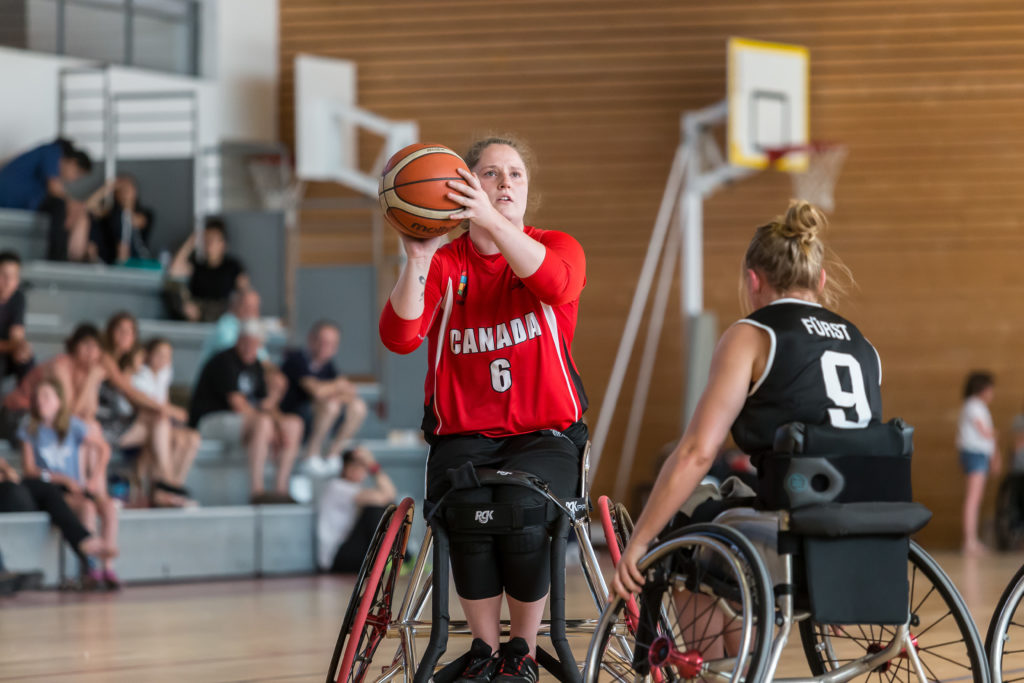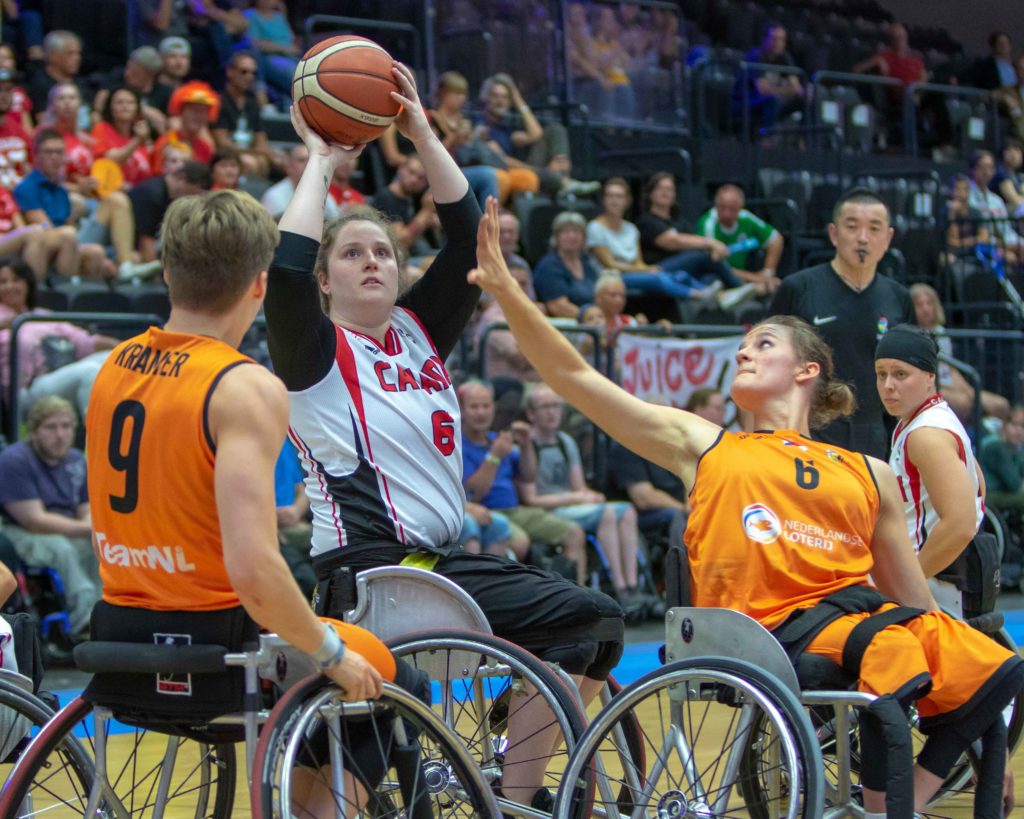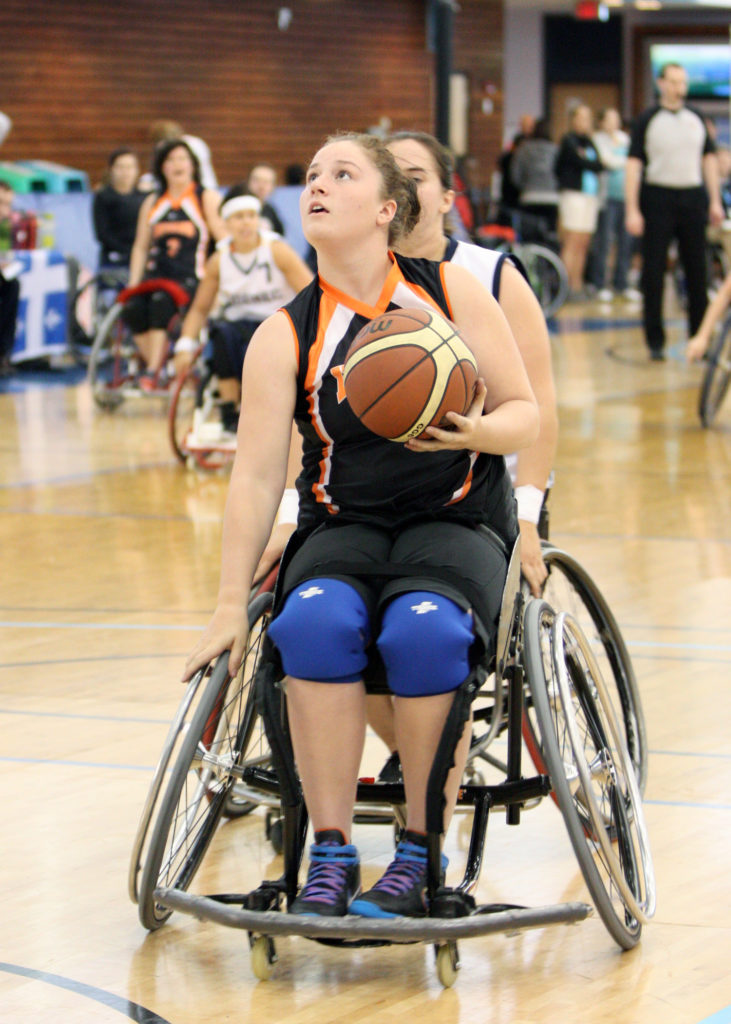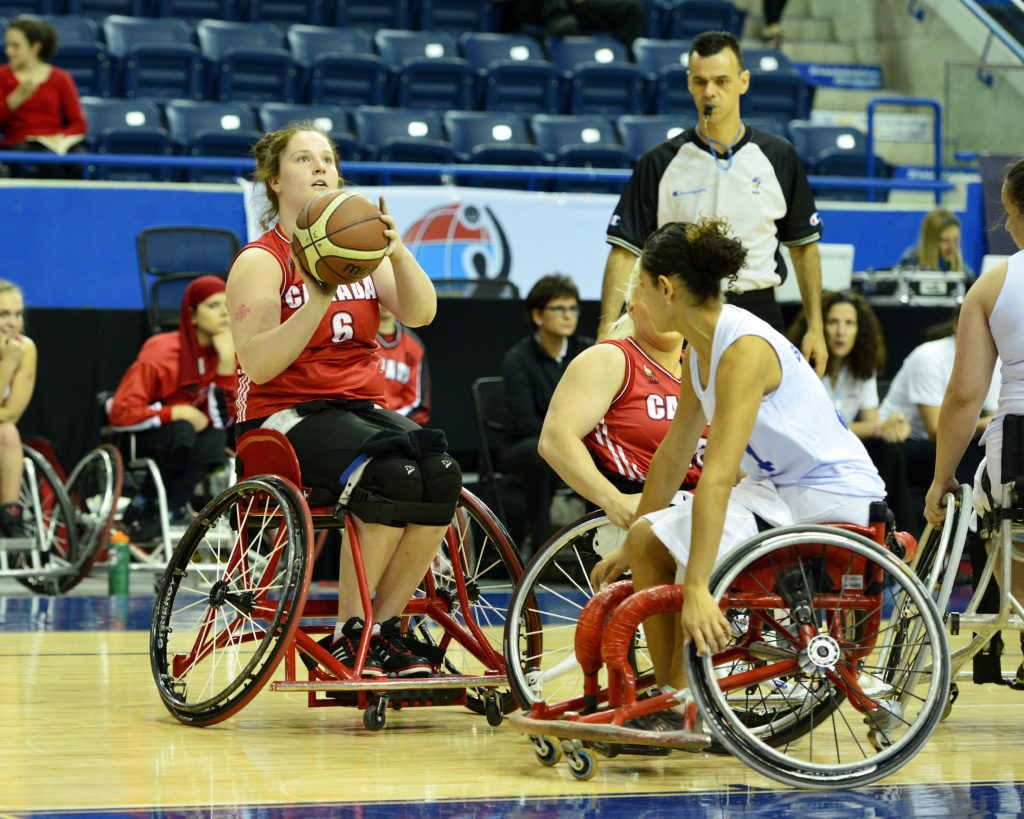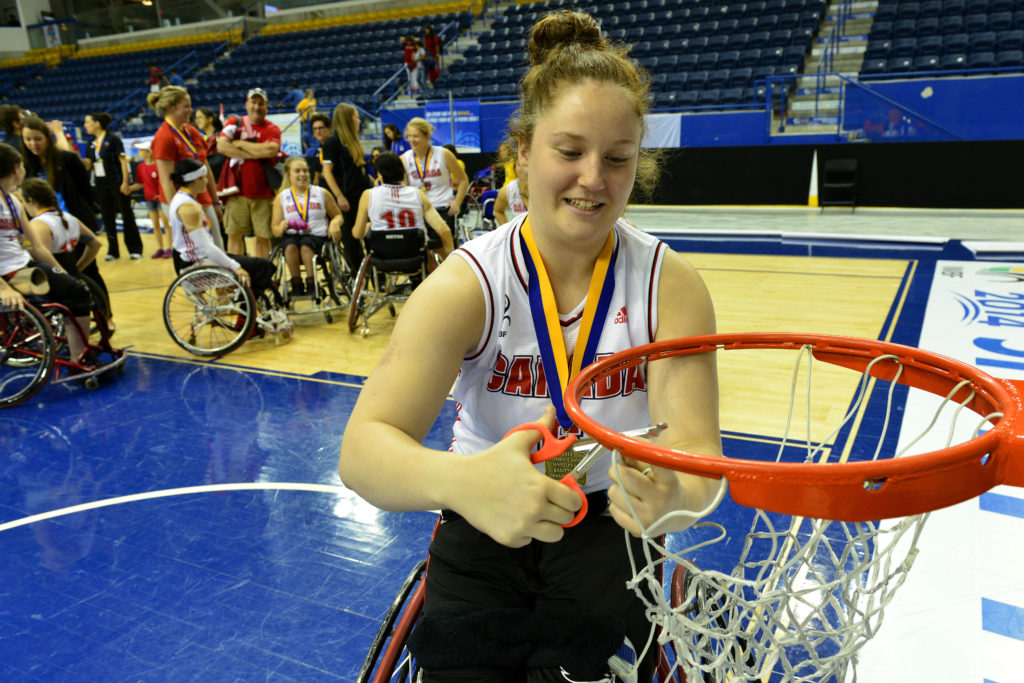Arinn Young, or “Juice” as she is known to her teammates, is 22-years-old and has already experienced many things in her sporting life – both positive and negative. Through the ups and downs, the accolades and injuries, Young has gained two things: perspective and focus.
“I feel like I’m a wise old lady,” she said with a laugh. She calls herself “really dedicated into whatever I’m doing.”
The Legal, Alberta native, who is a key member of the Canadian Senior Women’s National Wheelchair Basketball Team, has won numerous medals including gold at the 2014 World Championship. She has also won national collegiate titles with the University of Alabama and in the Canadian Wheelchair Basketball League (CWBL) with the Edmonton Inferno.
Young was named Wheelchair Basketball Canada’s female athlete of the year in April.
“I actually didn’t really think I would get an award like this,” Young said. “It’s really rewarding to know that people are seeing my progress and all my goals, but I was really shocked, and I’m so honoured to even be considered for this award.”
“I enjoy having fun with it,” she added. “I’m a really passionate person…I’m always excited for when teammates succeed in whatever they do, on and off the court.”
Young grew up on the farm in St. Albert and Morinville, Alberta, close to Edmonton. She gets her positive attitude from her parents growing up.
“We’re always taught to be good people, love and support people,” Young noted.
Her parents both played sports as well, and Young was involved in many different sports from a young age: basketball, lacrosse, horseback riding and shot put (where she finished third in the Alberta Track and Field Provincial Championships).
“I’ve been an athlete my whole entire life through all of my schooling years and all of my friends were athletes,” she recalled. “I was surrounded by people that always wanted to better themselves and work hard, and I’ve always been in that really good environment.”
Young suffered an ACL injury in lacrosse at 14, the first of her serious injuries that led her to wheelchair basketball.
“I was running, I had the ball. I was running up the boards to the opponents net and I got illegally hit from behind and I heard a nasty pop,” she recalled.
Young’s father, who also tore his ACL before, knew the severity of the injury right away. “My dad was like, well, you have to figure it out, you have to get up, learn from it, be better,” Young said. “And I did.”
Her damaged meniscus led to multiple surgeries. Her femur, patella and fibula were bone on bone. The recovery was a challenging process.
“It was really defeating when I originally got injured because I was such an athletic, outdoorsy person that I had to sit out,” she said. “I wasn’t in the right head space.”
She decided to continue with stand up basketball. She was also introduced to wheelchair basketball through Max McMillan, a coach and friend of her father.
“I was shocked,” Young said of her first time playing the sport. “I live in the middle of nowhere, so I really lived under a rock when it came to individuals with disabilities. So, at my first practice, I was amazed at the abilities, and what they could do.”
“Then when I got strapped into a chair and they said ‘your turn, go out there and have fun,’ I was like ‘what do I do?, what is this thing I’m strapped to?,’” she added.
“I stole the ball from a teammate and I gave it right back to her, because I didn’t know what to do. She was like ‘Arinn, you don’t apologize in this sport’ and that’s when I instantly knew I loved this sport.”
Wheelchair basketball appealed to her because it was just as aggressive and hard as stand up basketball and because it pushed her out of her comfort zone. It also provided her nickname.
It was early in her career when Young was playing in a tournament and the team was short on players because of injury. Young had to stay on the floor the entire game. “I was pretty dead at halftime,” she recalls.
Her coach brought her a juice box and told her to drink it. “I kind of sat there and chugged this juice box and came out of that halftime and was like a little kid on a sugar high,” she noted.
I scored a lot of points in a short amount of time. I was stealing the ball, I was playing really aggressive,” she added. “That’s how I got my nickname, Juice.”
Young joined the Edmonton Inferno wheelchair basketball team in 2012. The following year the team won the league title and she was named to the tournament all-star team.
Another injury to her other knee also came in 2013 during a tournament while playing with the Morinville High School Lady Wolves, putting an end to her stand up basketball career.
“I was laying on the floor, trying not to cry because of the pain and my coach came over to me, asking if I could play,” she remembers. “I looked at him and I said, ‘I’m going to go play for Team Canada and go play in the Paralympics’.”
“He kind of looked at me and said, ‘what are you talking about, are you joking?’” Young continued. “That was really when I set my mind right and I said I can do this, I can crush these goals. And I did [compete in the Paralympics in 2016] and it was the most satisfying thing so far in my career.”
In 2014 Young moved to Toronto to train at Wheelchair Basketball Canada’s National Training Centre and to study psychology at nearby Centennial College. “It was tough coming from a town that has about 300 people to living in Toronto,” she said. “You just take it day-by-day. I got a little bit homesick at first, but I had so much support here that it was easy to stay.”
Young was a late addition to the Canadian Women’s National Team named for the 2014 World Championships held in Toronto.
“When I first found out I made the team, I was shocked. I cried like a baby,” Young described. “It was kind of like a ‘I finally made it’ kind of feeling,”
Canada won the gold. Young was the youngest member of the team and contributed 14 points in three matches.
“It was a heart attack every game. You never knew what was going to happen,” Young said. “Just being able to fall on teammates in the process and fall on the coaching staff to have faith in us – that really helped us.”
They beat Germany 54-50 in the finals, in front of family and friends at the Mattamy Athletic Centre (formerly Maple Leaf Gardens). “When that final buzzer went off in the gold medal game, I just started bawling my eyes out,” Young said. “Now I’ve just been chasing that feeling ever since, wanting to win as much as we can and get back atop the podium.”
After a year developing and growing on and off the court in Toronto, Young chose to go to the University of Alabama starting in 2015. There she could continue to play high level wheelchair basketball and she enrolled in the kinesiology program.
Before her injuries, Young dreamed of playing stand up basketball at the collegiate level. Now, she was a member of one of the preeminent university wheelchair basketball programs and poised to experience more success.
“My first year there, I was a wide-eyed girl, soaking it all,” she noted. “Now that I’ve been there for four years, I love being there. I love the training environment, I love the culture they have, and our new facility.”
She’s won two national titles with Alabama, including the most recent one in 2019 when she was named MVP.
With all the on-court accolades, Young has also matured and grown as a person.
“I’m still known as a young buck and I like that people say I’m young but really mature in my game, and what I do, and who I am. I’m really lucky to be surrounded by so many people that have helped shape who I am as a person.”
Those people include her family, former teammates and coaches. Now, the youngster Young is amongst the leaders on the Canadian Women’s National Team who will compete in the Lima 2019 Parapan American Games August 23 to September 1. The Canadian women must finish top two to qualify for the Tokyo 2020 Paralympic Games.

